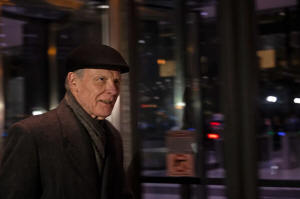In closing arguments, prosecutor alleges Madigan was driven by ‘power
and profit’
 Send a link to a friend
Send a link to a friend
 [January 24, 2025]
By Hannah Meisel [January 24, 2025]
By Hannah Meisel
CHICAGO – As prosecutors began their closing arguments Wednesday in the
trial of former Illinois House Speaker Michael Madigan, they accused the
longtime Democratic powerbroker of lying to the jury when he testified
in his own defense earlier this month.
“Ladies and gentlemen, what you heard on the witness stand was a
facade,” Assistant U.S. Attorney Julia Schwartz said, contrasting the
ex-speaker’s surprise testimony with evidence jurors haven’t seen since
the trial’s early weeks in October and November.
Madigan and his co-defendant, longtime Springfield lobbyist Mike
McClain, are accused of running a “criminal enterprise,” which Schwartz
told the jury was meant to “enhance and preserve Madigan’s power and
line Madigan’s pockets.”
“Power and profit: that’s what drove Madigan, with the help of McClain,
to break the law time and again,” she said.
Along with the overarching racketeering conspiracy charge, Madigan faces
22 other counts of bribery, extortion and other corruption charges.
McClain is also charged in several of those counts, though he has
already been convicted for his role in bribing Madigan along with three
other former lobbyists and executives from electric utility Commonwealth
Edison.
Prosecutors allege Madigan solicited bribes in the form of jobs and
contracts for his political allies – a handful of whom ended up raking
in $1.3 million over a period of years for doing little to no work for
ComEd – in exchange for an easier time pushing its preferred legislation
through the General Assembly.

Madigan and McClain are also accused of running a similar, albeit
smaller, bribery scheme with telecom giant AT&T Illinois and using the
former speaker’s position of power to steer business toward Madigan’s
property tax appeals law firm. But Schwartz’s presentation Wednesday
afternoon only got as far as the ComEd-related charges.
Under questioning from his own attorney earlier this month, Madigan
claimed ignorance of his political allies’ no-work contracts with ComEd
and said he didn’t learn that the men had merely been collecting
paycheck until the feds’ investigation became public.
His reaction then: “Very angry,” Madigan told the jury, explaining that
he’d known former Chicago Ald. Frank Olivo – a longtime neighbor in his
13th Ward power base on the city’s Southwest Side – “for years.”
“Frank knew that I worked all the time and that I expected people
associated with me to work all the time,” Madigan said. “He knew that
and given that knowledge, he should’ve been working. He should’ve done
his job.”
But in closing arguments Wednesday, Schwartz used Madigan’s yearslong
relationship with Olivo against him, reminding jurors that the two men
were so close, one of Olivo’s sons called the former speaker “uncle.”
“Madigan knew what Olivo was and wasn’t doing,” Schwartz said.
After Olivo retired from the Chicago City Council in spring 2011, he
became a consultant under external ComEd lobbyist Jay Doherty’s
long-running contract. Prosecutors allege the August 2011 contract start
date – in addition to an October 2011 contract for a law firm owned by
Madigan fundraiser Victor Reyes – was no coincidence for the fate of
major legislation ComEd ultimately saw become law later that year.
The so-called “Smart Grid” law was worth “hundreds of millions of
dollars” to ComEd, Schwartz pointed out. But defense attorneys have
pointed to the fact that the legislation originally passed the General
Assembly during lawmakers’ 2011 spring session, well before any of the
allegedly corrupt contracts were inked, and that Madigan and his
counterpart in the Senate had already committed to override then-Gov.
Pat Quinn’s veto on the law that summer.
Madigan testified that, like he’d done for many people over the years,
he’d passed Olivo’s resume on to McClain. The former speaker took steps
to distance himself from what McClain did after he’d referred jobseekers
to his longtime friend.

But Schwartz on Wednesday sought to prove otherwise, reminding the jury
of how another former alderman, Michael Zalewski of Chicago’s 23rd Ward,
also on the city’s Southwest Side, became the last Doherty subcontractor
in spring 2018.
At the time, Zalewski was about to retire after years in city council
and was looking for lobbying work – a common career path after office.
Schwartz played clips of four wiretapped calls from May 16, 2018, in
which Madigan, McClain, then-ComEd CEO Anne Pramaggiore and ComEd
executive Fidel Marquez discuss bringing on Zalewski under Doherty’s
contract. At the time, Marquez was not yet cooperating with the FBI.
“In one short day, Madigan makes the ask: ‘Get my guy hired,’ snaps his
fingers and it’s done. Zalewski’s added,” Schwartz said, reminding
jurors that the former alderman was paid $45,000 “for doing no work.”
Schwartz’s story was a bit of an oversimplification; earlier in trial
jurors heard calls dating back to the previous month in which McClain
discussed Madigan’s request to find Zalewski work with ComEd. Marquez
had also testified that he’d intended to actually give Zalewski
assignments, though the specific project for which the former alderman’s
expertise would’ve been needed was pushed off.
[to top of second column]
|

Former Illinois House Speaker Michael Madigan leaves the Dirksen
Federal Courthouse on Jan. 7, 2025, after his first day of surprise
testimony in his corruption trial. (Capitol News Illinois photo by
Ismael M. Belkoura)

But Schwartz’s larger aim was to refute Madigan’s testimony that he
merely passed along resumes and occasionally asked for updates to
prevent against being caught flat-footed if asked about the status of a
job recommendation.
The prosecutor pointed to the fact that in the last wiretapped call on
May 16, 2018, Madigan asked McClain if Doherty would be reaching out to
Zalewski so he could tell the former alderman that when he informed him
of the good news.
“He’s the one bringing up Doherty and ComEd,” Schwartz said. “He knew
(Doherty) was a pass-through.”
Further, Schwartz urged the jury to note the unusual nature of Madigan
being the one to inform Zalewski about his contract, saying it was proof
the speaker “controlled” the contract.
“Think about it: this is a public official making a job offer on behalf
of ComEd,” Schwartz said, adding that Zalewski hadn’t submitted a resume
or sat for an interview. “Because this is Madigan’s job. This is a
bribe.”
Not long after, call records show that Madigan did call Zalewski, though
there’s no recording of that call as neither phone had been wiretapped.
At one point during his time on the witness stand earlier this month,
Madigan agreed with McClain attorney Patrick Cotter’s contention that he
didn’t “know or care about the details” of McClain’s efforts to find
work for another of Madigan’s allies, former state Rep. Eddie Acevedo.
Schwartz on Wednesday extrapolated that sentiment to Zalewski’s case and
that of the other subcontractors.
“Ladies and gentlemen, this sequence shows you that was not true,”
Schwartz said. “Madigan is following up, he’s making sure it gets done,
and he’s making the job offer. These are not disinterested job
recommendations.”
Schwartz also pointed to how members of the alleged conspiracy “talk
when they think nobody’s listening,” especially wiretapped calls between
McClain and former ComEd exec John Hooker.
In one February 2019 conversation, McClain and former ComEd lobbyist
John Hooker discussed having come up with the subcontractor arrangement
in 2011, starting with Olivo. By the time of the call, Doherty had spent
years paying three other Madigan allies under his contract, while other
lobbyists close to Madigan had also taken on two of the do-nothing
contractors for periods of time.

“We had to hire these guys because Mike Madigan came to us,” McClain
told Hooker. “It’s just that simple … So if you want to make it a
federal court suit, okay, but that’s how simple it is.”
Hooker agreed, asserting that the arrangement was “clean for all of us.”
“Right. We don’t have to worry about whether or not – I’m just making
this up – whether or not Mike Zalewski Sr., is doing any work or not,”
McClain said, referring to a former Chicago alderman who’d been put on
Doherty’s contract the summer before, after he’d retired from the city
council. “That’s up to Jay Doherty to prove that.”
In another wiretapped call 10 months earlier, McClain and Hooker
discussed Madigan’s request to add Zalewski to Doherty’s roster.
“That has paid off for us in the past, Michael. It took me and you to
think of that, though,” Hooker said. “I think he (Madigan) thought I
might have been crazy when I suggested that.”
“Those aren’t words you use to describe a regular business deal,”
Schwartz said.
Keeping in tradition with the rest of trial – which was originally
scheduled to end before Christmas – predictions about timelines quickly
went out the window after U.S. District Judge John Blakey said he’d call
an early lunch so prosecutors could launch into closing arguments as
soon as possible.
Instead, attorneys had to finish arguments about various loose ends
before Blakey could even begin reading nearly 100 pages of jury
instructions – a dry recitation interrupted only by the opening bars of
the 1970s classic “Disco Inferno” as a phone went off in the gallery. By
the time the jury came back from lunch ready to hear closing arguments,
it was already after 2 p.m.
The late start will likely push the conclusion of closing arguments to
Monday, delaying the jury’s first opportunity for deliberation until
after the government’s rebuttal.
Capitol News Illinois is
a nonprofit, nonpartisan news service that distributes state government
coverage to hundreds of news outlets statewide. It is funded primarily
by the Illinois Press Foundation and the Robert R. McCormick Foundation.
 |